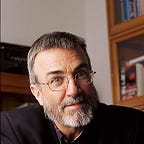On Reading “Amusing Ourselves to Death,” Chapter 8
After the apocalyptic Chapter 7, “Shuffle Off to Bethlehem” seems muted and narrow. Its argument is relatively simple: Religion too has been bastardized on television and by television.
Postman tells us that to prepare himself for writing this chapter, he watched forty-two hours of television’s version of religion. (The names of the television preachers from the 1980s might be unfamiliar to a younger generation — Robert Schuller, Oral Roberts, Jimmy Swaggart, Jerry Falwell, Jim Bakker and Pat Robertson.) But Postman says, “Forty-two hours were entirely unnecessary. Five would have provided me with all the conclusions, of which there are two, that are fairly to be drawn” (116).
The first conclusion is that on television, religion, like everything else, is presented, quite simply and without apology, as entertainment.
“Everything that makes religion an historic, profound and sacred human activity is stripped away; there is no ritual, no dogma, no tradition, no theology, and above all, no sense of spiritual transcendence,” Postman writes (116).
The second conclusion broadens the theoretical insight. Postman says that religion as entertainment “has more to do with the bias of television than with the deficiencies of these electronic preachers, as they are called” (116–17).
He explains: “Most Americans, including preachers, have difficulty accepting the truth, if they think about it at all, that not all forms of discourse can be converted from one medium to another. It is naive to suppose that something that has been expressed in one form can be expressed in another without significantly changing its meaning, texture or value” (117).
Like everything else in the age of show business, religion is shaped by the bias of television.
“Though it may be un-American to say it, not everything is televisible,” Postman says, though the word has become televisable in our time (118).
And in the effort to bring religion to television, once again, Postman finds reason to mourn what has been lost: “The spectacle we find in true religions has as its purpose enchantment, not entertainment. The distinction is critical. By endowing things with magic, enchantment is the means through which we may gain access to sacredness. Entertainment is the means through which we distance ourselves from it” (122).
He concludes, “the danger is not that religion has become the content of television shows but that television shows may become the content of religion” (124).
You can almost hear Postman singing the words of an iconic gospel song: “Give me that old-time religion.”
